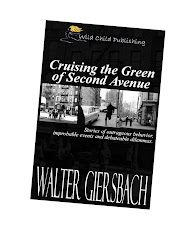Sunday, February 2, 2014
Who Is That Masked Writer?
J.K. Rowling caused a ruckus when Harry Potter’s creator published The Cuckoo’s Calling under the pseudonym of Robert Galbraith. For being “outed” by her own solicitors, she successfully sued. Not every writer is so secretive about his or her pen name. Everyone knew Mark Twain was really that guy in the white suit, Samuel Clemens. Lewis Carroll was Charles Lutwidge Dodgson’s essence. And, Ann Landers and Dear Abby aren’t one person, but many after 50 years.
Still, there may come a time when you need to consider an alias to hide your real persona. The excellent editor of my story collections, Cruising the Green of Second Avenue, at Wild Child Publishing has adopted several to publish. One for writing to men’s magazines, another when her ex was suing for divorce, and a third for her titillating romances. “Each pen name has its own personality,” she states. She was the one who advised me to take a pen name if it solves a problem and to hell with the critics.
Another friend uses two initials preceding her surname because of rude comments from friends over the several books she’s published. Fans of J.B. DiNizo won’t be too surprised to learn the woman behind the name is Alice DiNizo. Others may find a lot of explaining is needed when their book is read by their mother. Taking on a pen name can raise as many issues as it resolves.
Should you adopt a pen name? You’re surely aware that some fiction sells better if written by a woman — romance, for example. Or by a man, if the subject is dark and violent. Business books generally seem to sell better if written from a male POV. The gender issue relating to who gets published and reviewed is a contentious concern, as noted by The Guardian this summer; males writers far overshadow females in the U.K.
The subject matter may strongly dictate a pseudonym, such as erotic romance. If you’re a published writer of serious material, attaching your name to such “bodice-rippers” can cause negative spillover, reduce your literary stature, challenge reputation, and decrease enjoyment of the reading experience.
There’s another significant reason to use a pen name if the writer is of the opposite gender to his/her main character. Readers can easily be confused when starting a piece of fiction, becoming misled by the author’s byline, and discover the narrator is of the opposite sex. A sense of trust — even Coleridge’s “suspension of disbelief — is broken. The reader becomes distracted by the conflict of an author taking on the persona of the opposite sex, detracting from the quality of whatever he/she has written.
A host of other questions need to be addressed — and you’ll probably wrestle with them — before you step into another name. Is using a pen name liberating? (Only you can answer that.) Should you let people know you’re using a pen name? (If you do, why bother with a pen name?) What if people are upset that you’re using a pen name? (Some people will always be upset.) Does using a pen name mean you have multiple-personality disorder? (No, far from it.) Does using a pen name constitute a breach of trust? (Look at your value system and decide if you’re setting expectations that might be violated.) Is it hard to do business using a pen name? (No, unless you feel conflicted as a man trying to sell your book as “Gloria L’Amour” at a library reading.) Is using a pen name legal? (I’m not a lawyer, but most publishers insist on knowing your real name in accepting a work.)
Finally, you can put the whole matter to rest. Don’t use a pen name if you’re not comfortable doing so. And, if you’re going to tell the world your secret identity, why bother?
In the interest of full disclosure, let me add that I’ve published flash under a pen name. Why? My narrator is of the opposite gender, it’s stylistically experimental work, and it doesn’t fit into the body of writing I’m concentrating on. Sorry, I can’t tell you the byline I use.
For further discussion, go to the Men with Pens blog by James Chartrand at http://menwithpens.ca/pen-name-pseudonym/#comment-77581 and an article by Howard G. Zaharoff in Writer’s Digest http://www.mbbp.com/resources/iptech/pseudonyms.html.at
[This essay was published on Jan. 28, 2014, by
Flash Fiction Chronicles at http://www.everydayfiction.com/flashfictionblog/who-is-that-masked-writer/]
Subscribe to:
Post Comments (Atom)



No comments:
Post a Comment